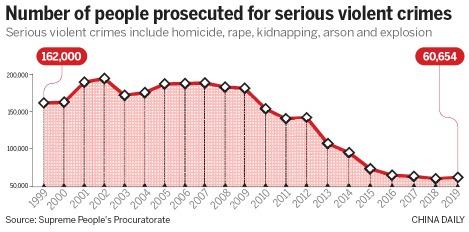 Procurator-General Zhang Jun delivers work reports of the top court and the top procuratorate, in Beijing, on May 25, 2020. (FENG YONGBIN / CHIAN DAILY)
Procurator-General Zhang Jun delivers work reports of the top court and the top procuratorate, in Beijing, on May 25, 2020. (FENG YONGBIN / CHIAN DAILY)
The number of people charged with serious violent crimes, including homicide, rape, kidnapping, arson and explosion, decreased by 63 percent between 1999 and 2019, bringing a real sense of gain, security and happiness to the people, the head of the Supreme People's Procuratorate said.
The number of people prosecuted for violent crimes fell to 60,654 last year, from 162,000 in 1999, with the annual decline averaging 4.8 percent, SPP Procurator-General Zhang Jun told China Daily
The number of people prosecuted for violent crimes fell to 60,654 last year, from 162,000 in 1999, with the annual decline averaging 4.8 percent, SPP Procurator-General Zhang Jun told China Daily.
Zhang said social governance has entered a new stage over the past 20 years.
Since China adopted the market economy with the deepening of reform and opening-up, manpower has grown and social management has expanded. This has led to a significant reduction in violent crime and a dramatic increase in other crimes involving economic development and social management.
Figures provided by the SPP showed that the number of crimes related to disturbing market order last year was 19.4 times higher than in 1999, with the increase in crimes related to the production and sale of fake or inferior products even higher, up 34.6 times. The number of crimes related to intellectual property rights infringement was 56.6 times higher.
Zhang said that with the onset of economic development, new legislation has been gradually introduced, which has increased the number of new types of crimes, such as reckless and drunken driving as more Chinese families began to buy cars.
Prosecuting departments charged 322,000 people with reckless driving last year and 249,000 people with theft, according to the SPP.
"However, there are still many social conflicts at some time, in some places or in some fields," Zhang said.

"We should severely punish mafia-style gangs and further investigate 'protective umbrellas' covering the crimes while deepening comprehensive social governance, resolving social conflicts and promoting social harmony through various measures such as civil and judicial mediation."
He said new types of crime have occurred and people have new demands, so prosecutors' concepts and policies must be updated and adapted to "uphold fairness and reflect the rule of law, combining punishment with leniency and more humanity".
The SPP said a typical example of the way prosecutors act to protect the innocent was a case in August 2018, in which Liu Hailong, who was driving a BMW, quarreled with cyclist Yu Haiming at an intersection in Kunshan, Jiangsu province, because Liu was occupying the lane reserved for nonmotorized vehicles.
Liu kicked Yu and used a machete to stab Yu's neck, waist and leg. Yu managed to take the weapon from Liu and then stabbed him to death in self-defense.
ALSO READ: Legal protections, services upheld during pandemic
Yu was detained by police in Kunshan, but after an investigation by the prosecuting department, it was determined that Liu had been driving drunk, and he was suspected of causing the trouble.
In September 2018, Yu was identified as having acted in justifiable defense and was absolved of criminal responsibility.
Kunshan police canceled the case according to law.
Zhang said prosecuting departments should continue following the concept of "fewer arrests and careful prosecution" to protect suspects' rights and other interests.
Last year, the number of suspects prosecutors decided not to charge increased by 32 percent compared with 2015, while the number of suspects in minor crimes that prosecutors chose not to take to court increased by 167 percent in the same period.
READ MORE: Courts have 'zero tolerance' for harm to health workers
"I think that such a big change brings the most real sense of gain and happiness to our people," Zhang said.
According to the SPP, the proportion of criminals sentenced to more than three years in prison decreased to 21 percent last year, from 45 percent in 1999.


